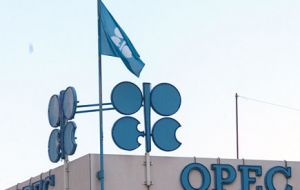MercoPress. South Atlantic News Agency
OPEC consensus for another oil production cut

Venezuela will insist at this week end’s meeting in Vienna of the Organization of Petroleum Exporting Countries, OPEC, that the cartel needs to impose more production cuts, an influential lawmaker said in Caracas.
Angel Rodriguez, the chairman of the National Assembly’s Energy and Mines Committee, told state television that OPEC’s supply-cut strategy already has produced some results but that the price is still too low.
“It’s important for the price to rise slowly and steadily” because the current range of 40 to 50 US dollars a barrel is causing investment in oil prospecting to slow, he said.
With the current oil price range, which in the case of Venezuela’s heavier, less-desirable crude is 30-40 US dollars, extracting petroleum at sea, for example, “is not profitable” because “the cost of offshore production amounts to 45” a barrel, warned Rodriguez.
“The investment that’s not being carried out is going to generate, once the (economic crisis is over), severe shortages and ... inflated prices,” and for that reason they should rise “slowly and steadily” for the benefit of both producers and consumers, the lawmaker said.
Rodriguez confirmed that he will travel in the coming hours to Vienna as a member of Venezuela’s official delegation to Sunday’s OPEC gathering.
“We’ll see there if a new cut is feasible or not,” Rodriguez said, adding that “consumer countries’ inventories are still high and should be reduced.”
Regarding Saudi Arabia’s possible opposition to a new supply cut, the legislator said that nation, which he acknowledged was “traditionally” allied with the United States, “has cooperated in a very significant way in this process and has supported the revitalization of the cartel.”
A Saudi-owned newspaper reported on Monday that the world's top exporter wanted stricter compliance with existing production cuts before considering more.
Venezuelan Economy Minister Ali Rodriguez told Caracas television last February that the country planned to push for a further supply cut at this week’s OPEC meeting, although he said then the request would only be formalized “if necessary”.
He said at that time that Venezuela, the world’s fifth-leading crude exporter and number four supplier to the US, believes that OPEC’s supply cuts already have succeeded in “halting the violent drop the oil prices were experiencing”.
In its most recent attempt to boost prices amid the sharp, global-crisis-induced drop in demand, OPEC decided last December to slash output by 2.2 million barrels per day, the group’s largest-ever cut.
Oil prices peaked at a record 147 USD per barrel last July, but plunged amid the global economic crisis that began last autumn.
On Sunday, Rodriguez, a former oil minister and OPEC secretary-general, said that low oil prices will continue for at least the rest of this year due mainly to “speculative” factors rather than supply and demand.
He said a prolonged continuation of this situation, which has resulted in a suspension of oil industry projects worldwide, will cause a new skyrocketing of prices to unimaginable levels.
Venezuela has reduced its production by 364,000 barrels per day in compliance with the OPEC supply cuts and, according to official figures, currently pumps 3.01 million bpd.
In related news Algeria’s Energy and Mining minister Chakib Khelil said the market is expecting a reduction adding that “if we do not reduce, prices would fall“.
”I think that the consensus (within OPEC) would shape up around stabilizing the market to reach a price of 75 USD per barrel,“ he told reporters and analysts gathered at the government-newspaper El Moudjahid Forum.
”Our objective is to attain 75 USD per barrel. That objective is in the interests of both producers and consumers” he added.
The Organization of the Petroleum Exporting Countries (OPEC) has since September agreed to cut output by 4.2 million bpd, around 5% of global supply.




Top Comments
Disclaimer & comment rulesCommenting for this story is now closed.
If you have a Facebook account, become a fan and comment on our Facebook Page!